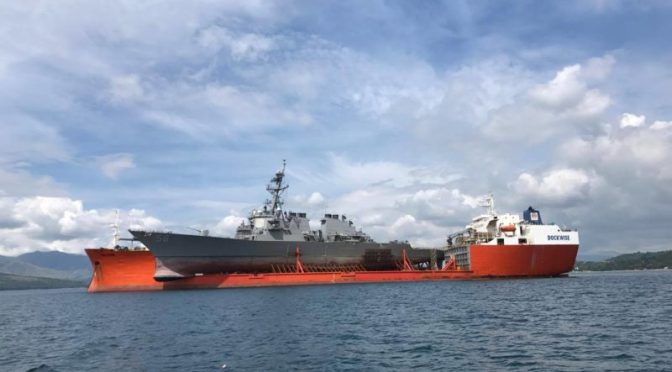By Dmitry Filipoff
Articles Due: February 5, 2018
Week Dates: February 12-16, 2018
Article Length: 1000-3000 words
Submit to: [email protected]
The U.S. Navy finds itself at an inflection point in the aftermath of two high-profile ship collisions that killed 17 sailors. But for years the Surface Navy in particular has struggled amidst crushing operational tempo and initiatives that backfired in attempts to reform training, maintenance, and manning. While numerous leaders at varying levels of seniority were relieved and remedial reforms are under way, the underlying problems that caused these collisions are deep-seated, pervasive, and self-inflicted.
This was made clear enough in both the Comprehensive and the Strategic Readiness Reviews that sought to make sense of these fatal mishaps. These findings come in the midst of numerous other issues that challenge the overall readiness of the Navy, such as how the Government Accountability Office claimed nearly 14,000 operational days have been lost over five fiscal years – days that ships were not available for operations – due to maintenance overruns. These claims come against a backdrop of hopeful ambition where the Navy hopes to grow to a planned 355 ships even while it struggles mightily to maintain the smaller fleet it has today.
Authors are encouraged to analyze the state of the U.S. Navy’s readiness and offer recommendations for reform. The emphasis should be on institutional means to improve warfighting readiness beyond simply buying new equipment. These recommendations can run the gambit from train, man, and equip activities to the nature of the operational employment and strategic tasking of the Navy. Authors are encouraged to cast a wide net and address looming issues that may become tomorrow’s tragic headline.
Dmitry Filipoff is CIMSEC’s Director of Online Content. Contact him at [email protected].
Featured Image: The Arleigh Burke-class guided missile destroyer USS John S. McCain (DDG 56) loaded on heavy lift transport MV Treasure. (U.S. Navy Photo)

